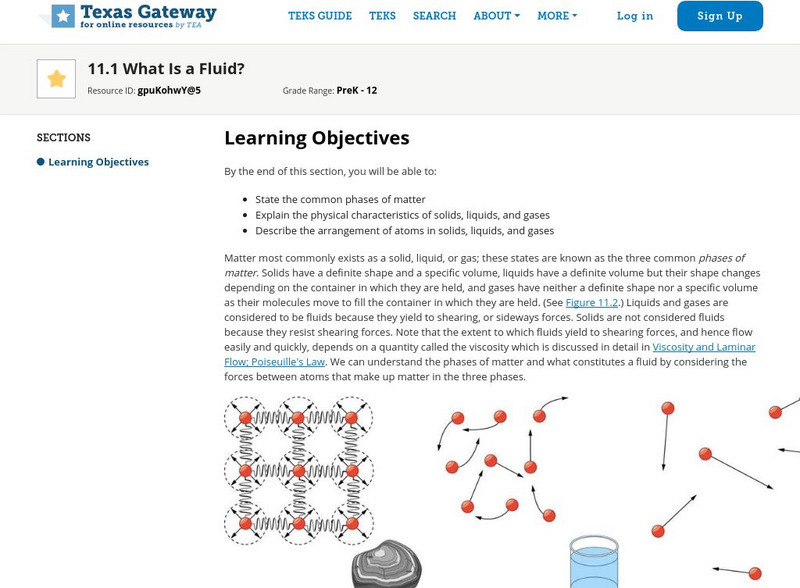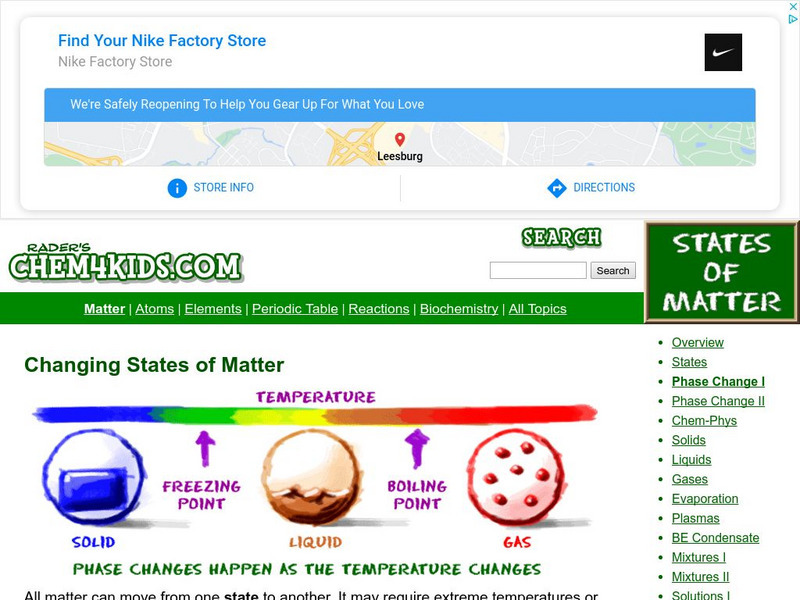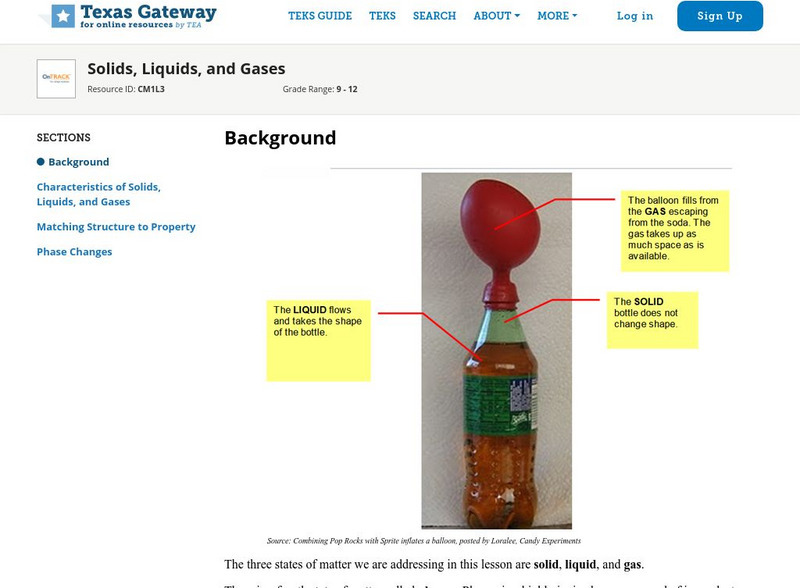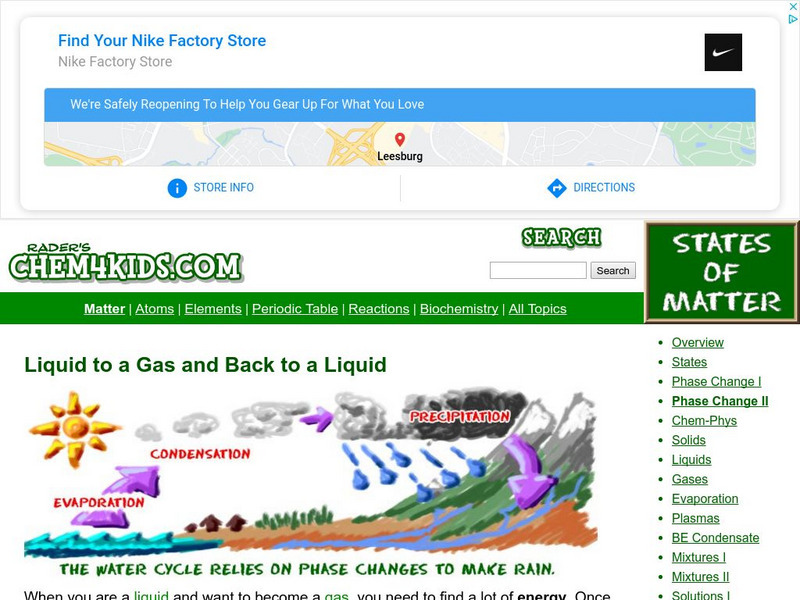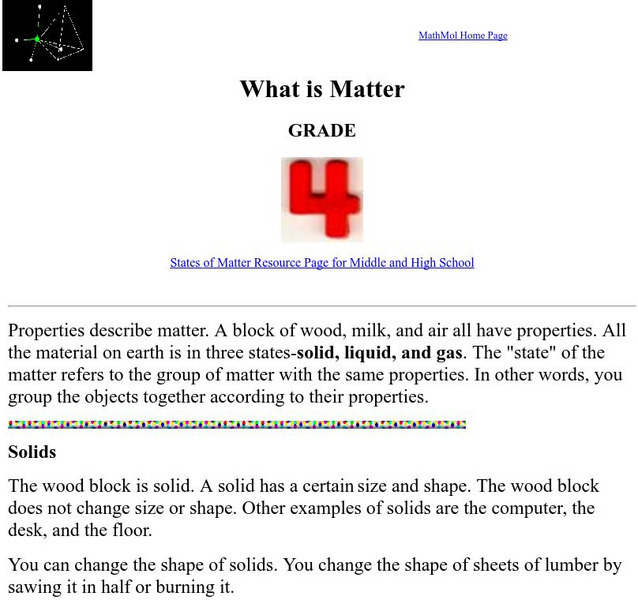Texas Education Agency
Texas Gateway: Ap Physics: Fluid Statics: What Is a Fluid?
By the end of this section, you will be able to state the common phases of matter; explain the physical characteristics of solids, liquids, and gases; and describe the arrangement of atoms in solids, liquids, and gases.
Chem Tutor
Chem Tutor: Chemistry: States of Matter
This lesson focuses on the states of matter: solids, liquids, and gases. It also discusses the Kinetic Theory of Matter, Thermodynamics, Triple point, Phase Change Graphs and the Heating Curve of Water. It provideds adrawing of a heating...
Lawrence Berkeley National Laboratory
Berkeley Lab: Phases of Nuclear Matter
A brief exploration of the states or phases of nuclear matter.
University Corporation for Atmospheric Research
Ucar: Just a Phase: Water as a Solid, Liquid, and Gas
This site helps students construct a model of the arrangement of water molecules when present as solid, liquid or gas. Includes background information, lesson plans, links to standards and assessment ideas.
Other
Science4us: States of Matter
In the States of Matter module, students further explore the concept that anything on earth that has mass and takes up space is matter. This exercise introduces students to solids, liquids and gases, the three most common states of...
Chem4kids
Chem4 Kids: Changing States of Matter
Find out how matter can change from one state to another.
CK-12 Foundation
Ck 12: Plix: Structure of Water: Phases of Matter
[Free Registration/Login Required] Explore this interactive by dragging the red dots to match each physical state of water with the correct picture of its molecules.
University of Notre Dame
Und: Properties of a Pure Substance [Pdf]
Often we find that different phases of pure substances can exist in equilibrium with one another. Let us consider an important gedankenexperiment (Latin-German for "thought experiment") in which we boil water. Ordinary water boiling is...
Georgia Department of Education
Ga Virtual Learning: Physical Science: Matter and the Atom
Students investigate the structure and parts of the atom, and learn about atomic mass and atomic number. They also explore the differences among solids, liquids, gases, and plasma.
CK-12 Foundation
Ck 12: Chemistry Simulation: Phase Change
[Free Registration/Login Required] Explore how heat and temperature relate to phase changes.
Center for Literacy and Disability Studies, University of North Carolina at Chapel Hill
Tar Heel Reader: Liquids: A Science Curriculum Resource Support
Read about solids, liquids, and gases, and find out about the phases of matter.
New York University
New York University: States of Water
Use this resource to learn about the three different phases of water; solid, liquid, and gas. What happens to water as it changes into a solid or gas? Includes short and easy to do activity.
American Chemical Society
Middle School Chemistry: Chapter 1: Solids, Liquids, and Gases
Five exemplary chemistry lessons about the three states of matter complete with handouts and animations.
CK-12 Foundation
Ck 12: Plix: Solid, Liquid and Gas
[Free Registration/Login Required] In this interactive you will move the red dot below each flask to observe how particles move in each different phase of water. You will need a sign-in to access this media, but it will be well worth...
American Chemical Society
Middle School Chemistry: Chapter 2: Changes of State
Five chemistry lessons about phase changes between the states of mattter complete with handouts and animations.
Texas Education Agency
Texas Gateway: Solids, Liquids, and Gases
Given descriptions, scenarios, or illustrations, students will distinguish between the compressibility, structure, shape, and volume of solids, liquids, and gases.
Other
Colts Neck Township Schools: Hands on Technology: Solids, Liquids, and Gases
Printable classroom-ready worksheets for a series of simple-to-implement experiments about the states of matter.
Florida State University
Florida State University: Intermolecular Forces: Changes of State
Discusses the changes of state that can occur for the three different types of matter (solids, liquids, and gases) and different types of heat energy that have been defined by scientists.
Chem4kids
Chem4 Kids: Liquid to Gas and Back to Liquid
This resource discusses ways liquids can change into gases and vice versa.
Science Education Resource Center at Carleton College
Serc: Mystery Material: Is It a Solid or a Liquid?
Is it a solid or a liquid? In this activity, students will handle a mystery substance that has qualities of both a solid and a liquid while learning about phases. They will manipulate the substance, record any observations they...
American Chemical Society
Middle School Chemistry: Changing State Freezing
Discover how freezing works, when the change of state moves from liquid to solid.
University of Florida
Chem. 2041 Lecture Notes: The Forces Between Molecules
A discussion of the variety of forces which hold molecules together. The relative strengths of these forces for the various states of matter is discussed. The effect of such forces on the boiling points and other phase change...
New York University
New York University: What Is Matter?
At this resource discover the difference between solids, liquids, and gases. Practice what you just learned with included review questions.
